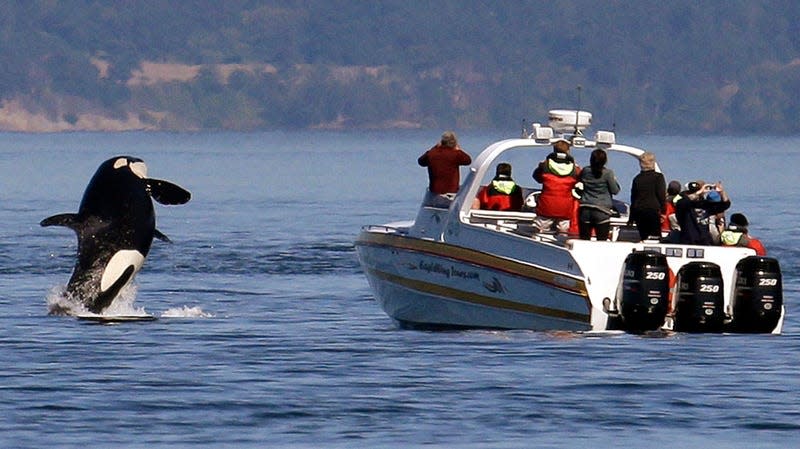A City in Washington Wants to Give Orcas Their Own Version of Human Rights

A mayor and city council in the Pacific Northwest are hoping to help a group of endangered orcas by formally declaring that these marine mammals should have legal rights.
The city of Port Townsend, Washington has proclaimed that Southern Resident Orcas, a sub-group of orcas that are listed as endangered under the Endangered Species Act, should have certain legal rights. The city council’s decree says that the orcas are “culturally, spiritually, and economically important to the people of Washington State and the world.”
Read more
Though the proclamation is supported by the city’s mayor and the council, it is non-binding. The move is an effort to get other agencies and policymakers to support legal rights for orcas, and to highlight how the current protections for haven’t been sufficient.
If it the rights recognized in the recent proclamation ever become law, lawyers will be able to defend orcas in court through a guardian process in which humans or organizations can act on behalf of the orcas, according to Inside Climate News. The non-binding proclamation doesn’t outline next steps for making the recognition legal, but it calls on local, tribal, and federal governments to “secure” these legal rights for the local orcas.
“The rights of the Southern Resident Orcas include, but are not limited to, the right to life, autonomy, culture, free and safe passage, adequate food supply from naturally occurring sources, and freedom from conditions causing physical, emotional or mental harm, including a habitat degraded by noise, pollution and contamination,” the proclamation by Mayor David J. Faber reads.
Orcas, also known as “killer whales,” are found across the world. These black-and-white dolphins are protected by the Marine Mammal Protection Act, but the number of orcas in the Salish Sea, which is in the Pacific Northwest surrounded by British Columbia and Washington state, have declined over time, and today there are only 73 orcas left there. These orcas face many challenges in the region, like lack of food and vessels interfering with their foraging and communication, according to a report from the Washington Department of Fish and Wildlife. The local Chinook salmon populations have rapidly declined in recent years, which is alarming because salmon are a main food source for the Salish orcas, according to the EPA.
The recent proclamation from Port Townsend’s city council points to the larger “rights of nature” movement, in which non-humans can be defended in court as if they had legal personhood. Some animals have already received legal protection through this movement.
In 2021, drug lord Pablo Escobar’s cocaine hippos were granted legal person status by the U.S. District Court for the Southern District of Ohio. When the Escobar was killed by police in 1993, animals that he had illegally smuggled into Colombia were relocated to zoos. But his hippos were notoriously difficult to catch and relocate, and they eventually bred and grew to a population of more than 100 hippos that have invaded the local environment. The South American country considered killing the Escobar hippos to rid the ecosystem of them, but Colombian attorney Luis Domingo Gómez Maldonado filed a lawsuit on the hippos’ behalf to save them.
To support the legal case in Colombia, advocacy group Animal Legal Defense Fund asked for the hippos to have an “interested persons” status so that wildlife experts could be deposed to provide testimony that supported non-lethal methods to control the hippo population. Though a U.S. decision doesn’t officially hold legal weight in a Colombian court, the recognition of legal rights for the hippos meant that experts from the U.S. could provide documents and testimony to support the animals. As of October 2021, veterinarians in Colombia had knocked out several hippos with tranquilizer darts and then surgically castrated them, The Guardian reported.
Other efforts to seek legal rights for animals haven’t been as successful. In 2018, a lone Asian elephant named Happy had a team of lawyers fighting for her right to be free. But earlier this year, New York’s highest court ruled that Happy was not a person, meaning that she is still in the Bronx Zoo.
More from Gizmodo
Sign up for Gizmodo's Newsletter. For the latest news, Facebook, Twitter and Instagram.

